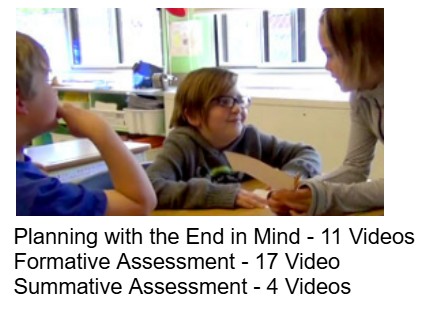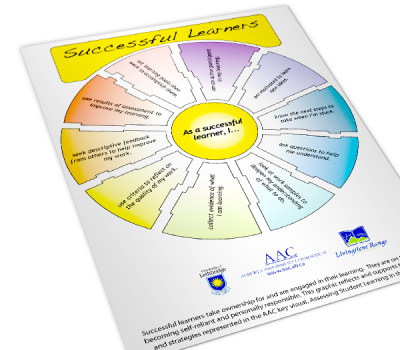Key Principles of Assessment - from the AAC Perspective
Whether you are a beginning teacher, or an experienced teacher who wants to think more deeply about classroom assessment, these professional learning modules are for you!
The goal of AAC professional learning is to provide food for thought. Whether you are browsing these materials on your own, or looking for something to use for a conversation with colleagues, we’re confident you will find something here to spark your curiosity and deepen your understanding of classroom assessment.
And when you’re ready to move beyond Assessment 101, there are plenty of other professional learning modules on the site to help you continue on your assessment journey.
Introducing AAC Assessment Vocabulary
Assessment is a complex topic. All Alberta Stakeholders play an essential role in our education system. Examples of interested stakeholders might be:
- Students, Parents and Caregivers
- Alberta Education Ministry
- Alberta Taxpayers
- Alberta Teachers Association Decision Makers
- College of Alberta School Superintendents
- Alberta Media Outlets and Reporters
- Educational Jurisdiction Decision Makers
- School Communities
- Instructional Leaders and Administration Teams
- Teachers and Education Assistants

For these groups of people to engage in healthy, accurate and effective communication about student learning and assessment, there must be a common understanding of assessment language.
Assessment Vocabulary Workshop - NEW CONTENT!


THESE RESOURCES ARE AVAILABLE FOR AAC MEMBERS TO DOWNLOAD. PLEASE LOGIN TO ACCESS.
Additional tools to support professional learning
Consider one of the following three activities for an upcoming staff meeting or department/grade level meeting. Each activity can be completed in about 15 – 20 minutes.
AAC Glossary Match
(based on Top 6 Picks)
AAC Member Only Content
These downloads are only available to AAC Members.
AAC Glossary Definitions (ABCD Cards and Top 6 Picks)
AAC Member Only Content
AAC Glossary Scavenger Hunt
(based on Complete Glossary)
AAC Member Only Content
Thinking More Deeply about Formative Assessment
There’s a lot more to formative assessment, or assessment for learning, than you might think. Explore these 6 mini-modules and gain a new respect for the power of formative assessment to support student learning.
Introduction to Formative Assessment
Although it’s called an introduction, we’re confident everyone will find something new to think about in this module.
Clarify the Learning Destination
Students will experience greater success when they are clear about the learning destination. Think about some practical tips to help you clarify the learning destination so you can pass it along to your students.
Provide Opportunities for Practice and Feedback
The ‘real world’ is full of examples of people who have opportunities for learning, practice, and feedback before they are ever required to perform. Students need these same opportunities. Learn how to make practice and feedback a natural part of learning.
Gather Ongoing Evidence of Learning
Assessment shouldn’t have to be a one-shot/high stress experience for students. Consider new possibilities for gathering evidence of learning in real time – and cut down on your marking!
Involve Students in the Assessment Process
Assessment shouldn’t be something that is done to students, but rather something that is done with students. But how do we actually make this work?
Purposefully Plan for Formative Assessment
While formative assessment can be – and often needs to be – spontaneous, intentionally planning formative assessment opportunities into lessons and units can help ensure that it happens! Feedback at the right time is the key to student success!
Thinking about Outcomes through the Lens of Assessment: A Four-Step Process
The first step in designing instruction and assessment is to ensure we understand what the learner outcomes are asking of our students. This understanding will not only guide our instruction, but will also lead us to gather appropriate evidence of learning. This module introduces a 4-step process for examining outcomes through the lens of assessment. Let’s ensure our assessment and curriculum are working together!
Feedback: The Foundation of Formative Assessment
Learning to give and receive feedback takes practice and patience, but it is absolutely worth the investment. Watch as this teacher and student share some of their insights about how they are using feedback – for learning!
Who is the Audience for Formative Assessment?
AAC Member Only Video
Who is the audience for formative assessment?
Who is the audience for formative assessment?
Public Content
Our electronic grade books can do amazing things. Some are even set up with a separate bin to record the marks of formative assessment. But just because they can do that, doesn’t mean that we should do that. Even if the bin is eventually weighted at zero, recording marks for formative assessment can have some unintended consequences.
Watch as Ruth Sutton makes a case for keeping formative assessment between teacher and student.
If your jurisdiction policies require recording and reporting formative assessment, then of course you will need to follow the policies. But, you can still think deeply about the purpose for formative assessment. Even if your policies identify a minimum requirement, this does not need to define the way formative assessment plays out in your classroom. How can you follow policy requirements, and still hold true to formative assessment that is based on Dylan Wiliam’s vision of “minute by minute, day by day” feedback to support student learning, not merely measure it?
Remember, the compelling research base for improved student learning is based on the consistent implementation of formative assessment – not on recording marks and grades.
Formative Assessment: Beyond Tricks for Teachers
We often hear presenters talk about a teacher’s ‘toolbox’. While you may learn new ideas from a workshop or an online video, remember that formative assessment goes beyond tips and tricks for teachers.
Ruth Sutton talks about the foundational principles behind the work of formative assessment. Without consciously thinking of those principles, the power of formative assessment could be lost.
Want to learn more?
Explore a collection of videos about feedback in action in a variety of Alberta classrooms.

Work through the professional learning modules to accompany the AAC publication, Creating Credible Criteria.

Work through the professional learning modules to accompany the AAC publication, Scaffolding for Student Success.

Download Foundational Documents
The following documents describe and represent principles of sound classroom assessment practice within the Alberta context.
AAC Key Visual

The AAC Key Visual describes and represents three key and interconnected processes involved in assessing student learning in the classroom.
AAC Successful Learners

Written for a student audience, this visual describes qualities of a successful learner.
